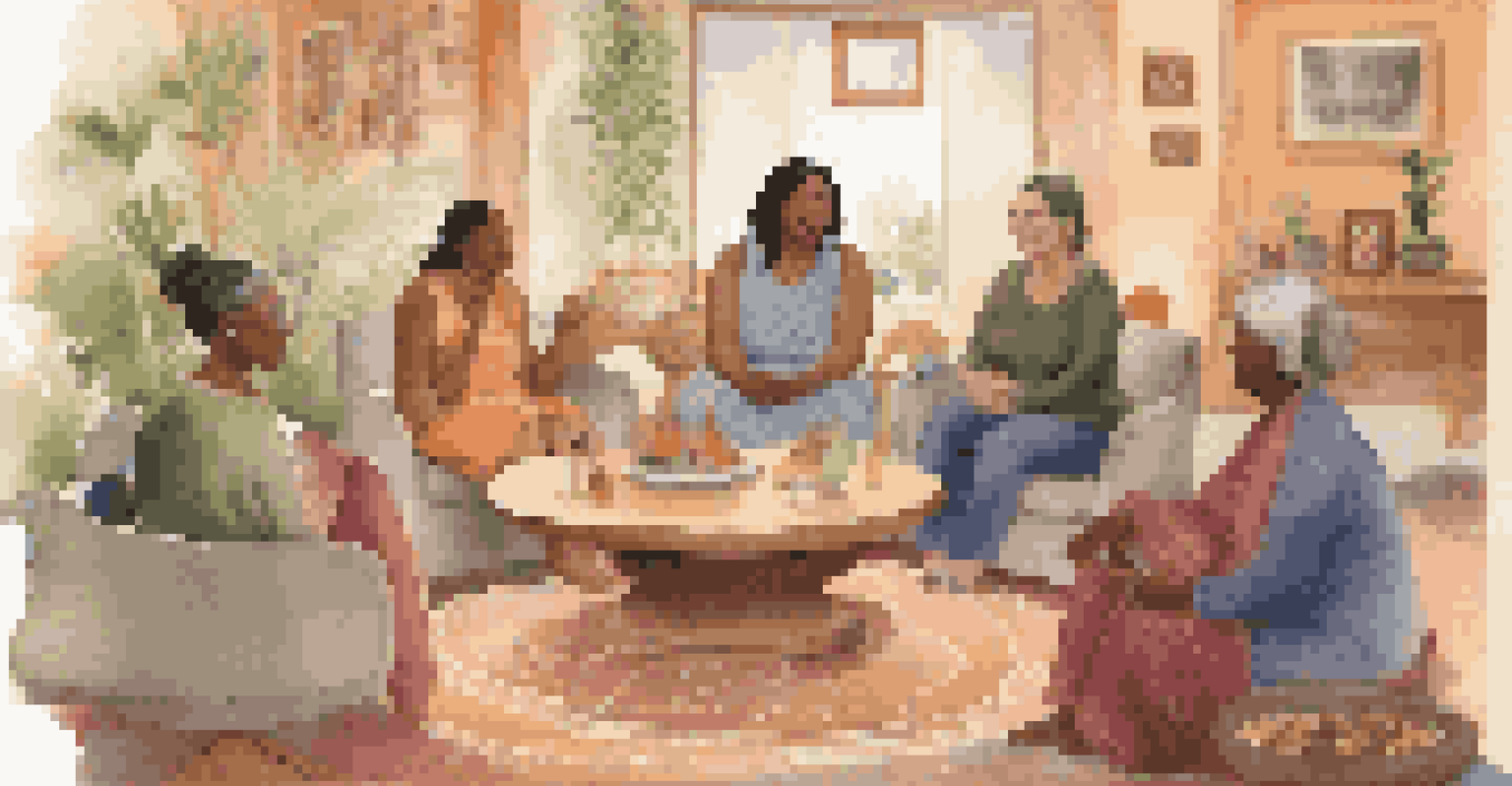Menopause and Cultural Perceptions: Global Health Perspectives

Understanding Menopause: A Universal Experience
Menopause is a natural phase in a woman’s life, marking the end of her menstrual cycles, typically occurring in her late 40s to early 50s. While it’s a biological process experienced by women worldwide, cultural perceptions of menopause vary significantly. In some cultures, menopause is viewed as a negative transition, filled with stigma and fear, while in others, it is celebrated as a rite of passage that brings wisdom and freedom.
Menopause is not the end, but a new beginning.
For instance, in many Western societies, menopause is often associated with aging and loss, leading to a focus on symptoms and medical treatments. This perspective can sometimes overshadow the potential for positive changes, such as increased confidence and liberation from reproductive responsibilities. Conversely, in certain Indigenous cultures, menopause is recognized as a time when women gain respect and status within their communities.
Understanding these diverse perspectives can help women navigate their menopause experience, as cultural context influences how symptoms are interpreted and managed. By fostering open conversations about menopause, societies can shift the narrative from one of fear to one of empowerment.
Cultural Attitudes Toward Menopause in Asia
In many Asian cultures, menopause is often met with a mix of respect and apprehension. For example, in countries like Japan and China, older women are generally revered, and menopause can be seen as a transition into a respected elder role. However, the physical symptoms associated with menopause, such as hot flashes, can bring discomfort and are often discussed in hushed tones, leading to a lack of open dialogue.

Traditional practices in some Asian cultures, such as herbal remedies and acupuncture, are commonly used to alleviate menopausal symptoms. These practices reflect a holistic approach to health, emphasizing balance and natural remedies. Yet, the rapid modernization in these societies can lead to a clash between traditional beliefs and Western medical practices, creating confusion for many women.
Cultural Views Shape Menopause
Cultural perceptions of menopause vary greatly, influencing how women experience and manage this natural transition.
Encouraging dialogue about menopause in Asian communities can help bridge the gap between tradition and modernity, empowering women to embrace this natural phase of life. By sharing experiences, women can find support and understanding, transforming menopause from a taboo topic into one of shared wisdom.
Menopause Perceptions in African Cultures
In many African cultures, menopause is often viewed through a lens of spirituality and community. Women may be celebrated for their life experiences, and menopause can signify a transition into a new role within their family and society. In some communities, older women are seen as keepers of tradition, and their wisdom is highly valued, providing a sense of purpose during this life stage.
The greatest gift you can give yourself is a little bit of your own attention.
However, the lack of access to healthcare and education about menopause can lead to misinformation and stigma. In areas where traditional beliefs dominate, menopause might be associated with negative connotations, such as loss of fertility or femininity. This can create a sense of isolation for women experiencing symptoms, as they may feel reluctant to seek help.
Promoting awareness and education about menopause in African communities can empower women to embrace this transition positively. By combining traditional beliefs with modern health perspectives, communities can foster supportive environments where women feel valued and understood during their menopausal journey.
Menopause and Western Perspectives
In Western countries, menopause is often medicalized, with a strong focus on its symptoms and potential treatments. This perspective can lead to a negative narrative surrounding menopause, where it is seen as a condition to be treated rather than a natural transition. The prevalence of advertisements for hormone replacement therapy and other medical interventions often reinforces this view.
Despite this medicalized approach, there is a growing movement among women to reclaim menopause as a positive life stage. Many are advocating for more open discussions about experiences and symptoms, aiming to destigmatize the conversation. This shift encourages women to view menopause not just as an end, but as an opportunity for personal growth and self-discovery.
Education Empowers Women
Comprehensive education about menopause can help normalize the experience, reduce stigma, and foster supportive communities.
By embracing a more holistic view of menopause that includes emotional, social, and physical aspects, Western societies can foster a healthier understanding of this life stage. Celebrating menopause as a natural transition can help women feel empowered to share their stories and connect with one another.
The Role of Education in Shaping Menopause Perceptions
Education plays a crucial role in shaping cultural perceptions of menopause. In many societies, a lack of understanding about menopause can foster fear and stigma, leading women to feel isolated during this transition. By providing comprehensive education about the biological and emotional aspects of menopause, societies can help normalize the experience and promote a supportive environment.
Workshops, seminars, and community discussions can serve as platforms for women to share their experiences and learn from one another. These initiatives can empower women to seek support and find effective coping strategies for managing symptoms, thus fostering a sense of community. Additionally, educating healthcare providers about cultural perceptions of menopause can ensure that women receive empathetic and informed care.
Ultimately, education can transform menopause from a taboo topic into a shared experience, encouraging women to embrace this life stage with confidence. By valuing and validating women’s experiences, communities can create a more inclusive narrative around menopause.
Menopause in the Media: Representation Matters
Media representation of menopause significantly impacts cultural perceptions. Unfortunately, many portrayals of menopause in film and television tend to emphasize negative stereotypes, focusing on symptoms in a comedic or exaggerated manner. This can reinforce the stigma surrounding menopause and perpetuate misconceptions about what women experience during this time.
However, there is a growing movement to change the narrative through more realistic and positive portrayals. Shows and films that feature well-rounded female characters navigating menopause can help to normalize the conversation and provide relatable examples for viewers. When women see their experiences represented authentically, it can foster a sense of solidarity and understanding.
Media Representation Matters
Positive and realistic portrayals of menopause in the media can challenge stereotypes and promote a healthier dialogue around the topic.
Encouraging diverse and realistic portrayals of menopause in the media is essential for shifting societal attitudes. By highlighting the nuances of this life stage, media can challenge stereotypes and promote a more empowering narrative for women experiencing menopause.
Global Health Initiatives Addressing Menopause
In recent years, global health initiatives have begun to address menopause as a critical aspect of women's health. Organizations like the World Health Organization (WHO) are recognizing the need for targeted research and resources to support women during this transition. By focusing on menopause as a public health issue, these initiatives aim to improve awareness, education, and access to care.
These initiatives often emphasize the importance of culturally sensitive approaches, recognizing that perceptions of menopause vary widely across different regions. By tailoring programs to meet the unique needs of diverse communities, global health efforts can ensure that women receive appropriate support and care. This can include providing educational materials in multiple languages and promoting discussions that respect cultural beliefs.

Ultimately, global health initiatives play a vital role in transforming how menopause is viewed and managed worldwide. By prioritizing women's health during this phase of life, we can create a more supportive environment that empowers women to navigate menopause with confidence and dignity.